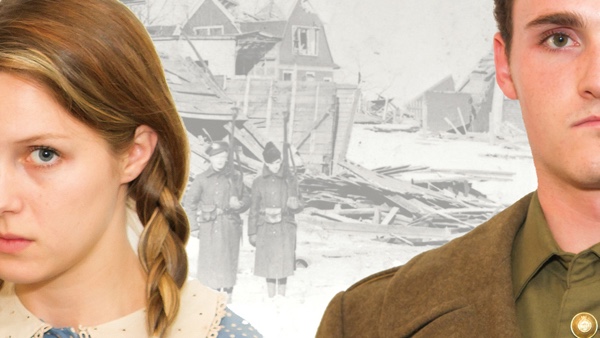Who to Blame for Canada’s Greatest Tragedy?

At 9 a.m., December 6, a chilly morning in 1917, two ships, one a French transport loaded with explosives, collided off Halifax, Nova Scotia, in Canada. The explosion caused by the crash was the largest single man-made explosion in world history until the dropping of the atomic bomb on Hiroshima, Japan, in 1945. Over 2,000 people were killed in Halifax and 9,000 were injured (more than 300 were blinded). More than 25,000 people were left homeless. It was a tragedy on the level of America’s 911, but for nearly one hundred years Americans knew very little about it.
Now, in Shatter, Trina Davies’ new play, that just opened at Urban Stages in New York, the entire, haunting story unfolds. Davies’ play is a strong, powerful story that, while it has its problems, is Christmas come early for history buffs, especially those interested in Canada.
The play covers the hatred of Germans living in Halifax at the time of the explosion. Many in the city’s populations blamed them, theorizing that since Germany was at war with Canada, and England, Germans in Canada who were loyal to the Kaiser must all be spies and agents. In Davies’ play, the hammer of guilt smashes down on Elsie Schultz, a mild mannered German woman in her sixties who, apparently, has done nothing wrong. They all harass poor Elsie, though, and use any odd thing she ever did as a reason to tie her in to worldwide espionage and the horrific explosion. She is ostracized and her house trashed. Everybody in Halifax loses control of their senses and blames Elsie (which, by the way, they did at the time) and her fellow German immigrants.
Within the story of the persecution of Elsie is a rather tender love story that tells the tale of a Canadian soldier, Brian, and a young girl living in Halifax, Elsie’s friend Anna. Anna’s mother is blinded by the explosion. A third sub plot is the destruction of Anna’s home, where she lived with mom, Jennie. The pair now has to live in a cold railroad boxcar.
Shatter is an intriguing history play. I found out about the explosion a few years ago when, accidentally, I wandered into a spacious museum in Halifax and saw an exhibit on the tragedy. Few in America know of it, though. The hatred of the Germans in Shatter in World War I reminds you of the Americans’ World War II fear and hatred of the Japanese living on the west coast, who were quickly dispatched into internment camps in the west and lived out much of the war as prisoners, charged with something they had nothing to do with. The razor sharp emotions of Shatter are the same.
Urban Stags helps the audience by providing a background history on the disaster in the program. You can read that and be very informed for the play that is to come. The history helps fill in the spaces of the show.
The special effects in Shatter are pretty good, especially the explosion itself. The seats in the audience rumble from the power of the blast. Set designer Rebeca Phillips also did a fine job in building a temporary morgue for the 2,000 bodies, which is partially seen on stage. Director Susan Fenichell has done a good job of intertwining the three stories on stage into one smooth tale. She gets fine performances from Jackie Hansen as Anna, Hollis McCarthy as her mom, Jennie, Michael Chris McGuire as the soldier, Brian, and Rebecca Nelson as Elsie, the German woman.
Shatter needs more shatter, though. Except for the explosion, and some newspaper headlines telling of tragedy, the play has little about the horrific explosion itself. Thousands of rescue workers tried to get to Halifax, but were delayed by a blizzard. Everything that could go wrong did go wrong in the aftermath of the explosion. Hundreds of innocent Germans were arrested as spies. Hundreds of unidentified bodies were dumped into a mass grave. Some of these incidents are mentioned in the play, but not fleshed out enough. What was Canada’s reaction to the blast? How did it affect its role in World War II? The play needs more information.
There is also a lack of collective emotion in the play. We empathize with the individuals on stage, but no not feel great sympathy for them as a group. There was something lost along the way as the story unfolds. We just do not care a whole lot about them, even though we should. There have been 911 plays that put the spotlight on the emotions of all the victims as well as the tragedy itself, and Shatter needs to do that, too.
PRODUCTION: The play is produced by Urban Stages. Sets: Rebecca Phillips, Costumes Kim Krumm Sorenson, Lighting: Mary Louise Geiger, Sound: Sean Hagerty, Production Design: Lucy MacKinnon. The play runs through November 16.